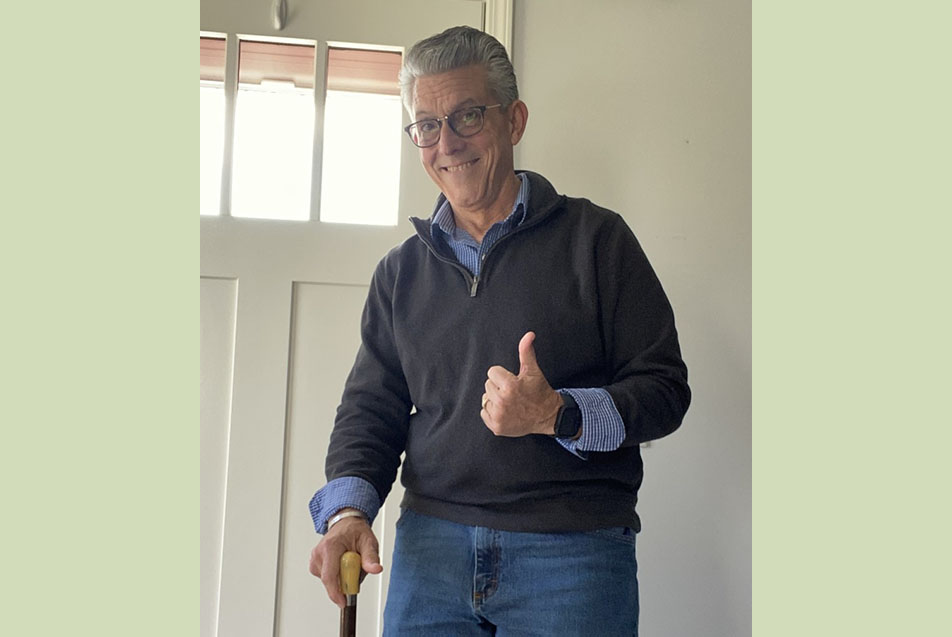
Life is unpredictable. There’s no way to prepare for it. All we can do is acknowledge and embrace the unexpected while making the most of the opportunities thrown our way. Rob Kee is a prime example of this. His positive attitude and unwavering faith help him find the beauty in each day despite living with a rare health condition. He shares details from three significant hospital stays over the past three years and why, following these experiences, he entrusts the dedicated professionals at Parkview with his care.
Rob was born with a very rare vascular disease called Klippel-Trenaunay Weber syndrome (KTW). This uncommon congenital malformation causes problems with the development of blood vessels, soft tissues, bones and even the lymphatic system. It’s estimated to affect roughly 1 in 100,000 people worldwide. Currently, there is no cure for KTW, but the goal of treatment is to improve symptoms and prevent complications.
Five years ago, Rob and his family moved to Indiana in search of better treatment options. Despite the move, his health continued to deteriorate. “I could barely walk across the room,” he admitted. “So, I decided to listen to my wife as she firmly (but gently) suggested I find a new general practitioner and cardiologist now that we were in Fort Wayne. That’s when I called Parkview.”
Living with KTW, Rob has had to deal with a host of health problems throughout the entirety of his life, often resulting in medical treatment and hospital stays. In fact, it happens so often, Rob lovingly refers to Parkview Regional Medical Center as his own personal “resort” and Parkview Hospital Randallia as his “day spa,” because he has always felt pampered and well cared for at the facilities, even during some of the scariest moments of his life.
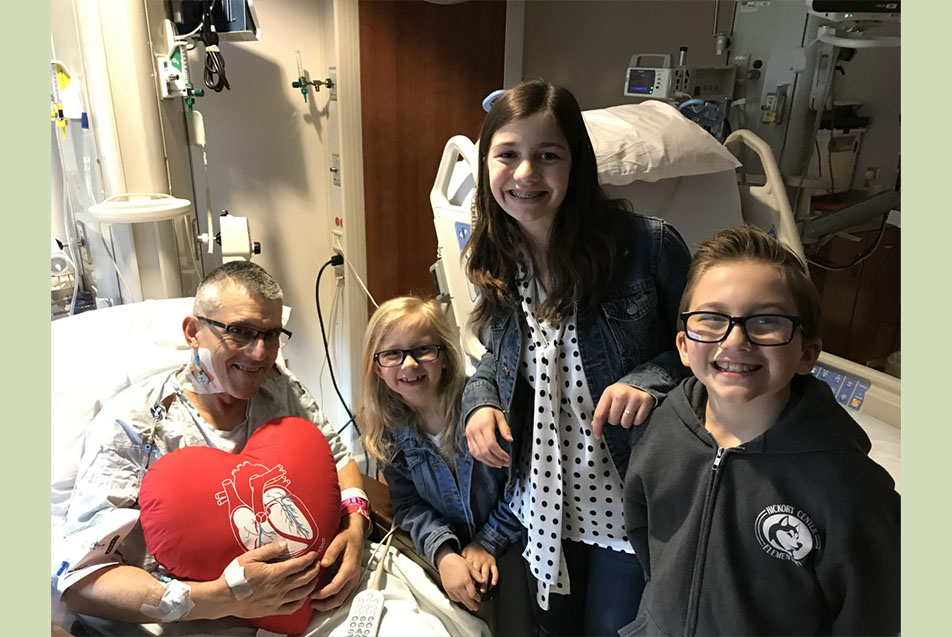
Stay No. 1
In May 2019, Rob began his journey by seeing Sara Schlie, DO, PPG – Family Medicine & Pediatrics. During his visit, Rob explained his rare condition and described his symptoms. But because the function of his heart was affected, Dr. Schlie felt it was important for Rob to see a specialist. Recognizing he would benefit from a specialized approach and the help of a cardiologist, Dr. Schlie referred Rob to Peter Chaille, MD, PPG – Cardiology, a physician in the Vascular Clinic at the Parkview Heart Institute.
After meeting Rob, hearing about his rare condition, and taking his new symptoms into account, Dr. Chaille gave him two options: 1) begin with a process of elimination over the next several weeks or 2) move forward with a more assertive approach to help understand why he was experiencing his current symptoms. After enduring testing for most of his life, proudly referring to himself as (most likely) “the longest-living guinea pig with this condition,” Rob opted for answers. He chose to move forward with the more assertive of the two, a minimally invasive procedure known as heart catheterization.
The procedure revealed several issues that Dr. Chaille expected and a few he didn’t. He informed Rob and his family that three of Rob’s major arteries were 100%, 95% and 75% blocked, and his aortic valve had stopped working altogether.
Due to the severity of Rob’s case, he was immediately scheduled for surgery to replace his aortic valve with a mechanical one and address the other blockages by way of multiple bypasses. “I was supposed to be in the hospital for a couple of days,” Rob recalled. “But I ended up being there for about a week due to some complications related to my vascular disease. They weren’t comfortable letting me go just yet. And I was okay with that because I knew I was in good hands.”
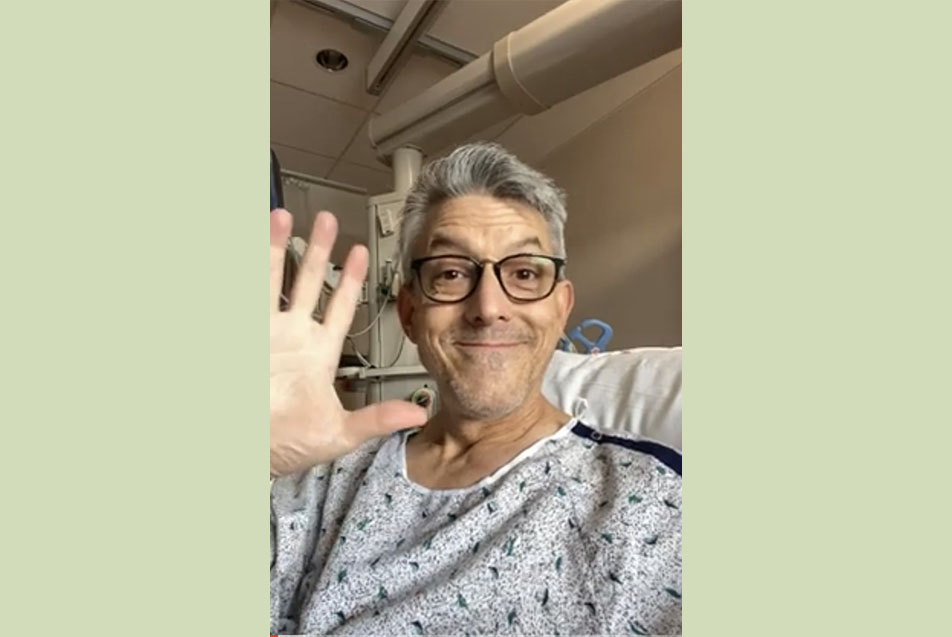
Stay No. 2
Almost a year later, in July 2020, during the Fourth of July weekend and well into his recovery from the heart and multiple bypass surgeries, Rob began to take a turn for the worse. “After my surgeries, I thought I was going to feel better,” Rob explained. “I was so confused. It had only been a year, and I was already starting to feel bad again. Something wasn’t right.”
Once again, trusting the instincts of his wife, Rob contacted Dr. Chaille’s office to find out what was happening. Further testing revealed that he had ulcers in his upper gastrointestinal tract causing severe internal bleeding. “They also realized that my hemoglobin levels were extremely low and instructed me to get to the emergency room immediately,” Rob said.
A healthy range of hemoglobin for men is 13.2-16.6 grams per deciliter. By the time Rob arrived in the emergency department (ED), his hemoglobin level had dropped dangerously low, to 6 grams per deciliter, which, left untreated, could lead to serious health complications and life-threatening circumstances.
His emergency care team quickly began blood transfusions. Unfortunately, Rob was bleeding out so fast that they couldn’t keep his hemoglobin levels up, even after five transfusions. To stop the bleeding, his care team decided to cauterize the ulcerations causing the blood loss. “At one point, I remember my wife asking the doctor what was causing this to happen,” Rob said. “The only thing they could attribute it to was my vascular disease, KTW.”
Curious about her husband’s diagnosis and next steps, Rob’s wife asked, “Are there any more ulcers, and if so, can you fix them?” Rob’s physician discovered that there were, in fact, hundreds of ulcers within his GI tract that were waiting to burst. Regrettably, the action needed to repair them wasn’t a viable option. The sheer number of procedures to mend the ulcers at one time would create a sore too large to heal properly and could be detrimental to Rob’s health. Today, Rob and his family are in a bit of a waiting game regarding his ulcers. Fortunately, when the problem arises again, they know what to look for, who to contact and where to go. “Life with this vascular disease can be challenging, but I’m always confident in the care I’m receiving at Parkview,” Rob said.
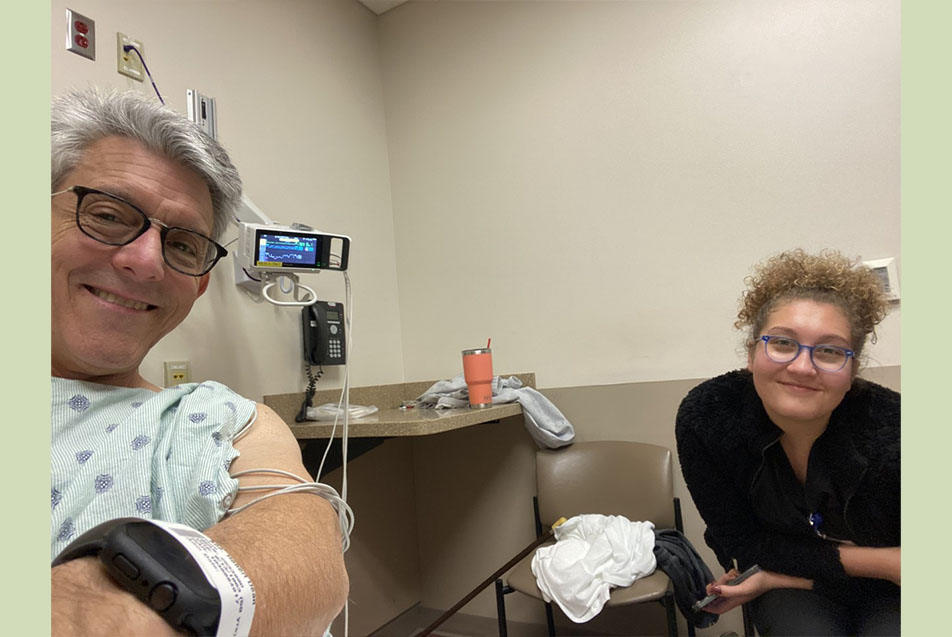
Stay No. 3
One evening, several weeks ago, Rob began to feel unusual. “Honestly, I just felt off and completely disconnected in my body,” he recalled. “It’s nothing new and happens sometimes, given my condition, but this felt different.” Later that night, Rob woke to excruciating pain in his left leg. “It felt like someone had pummeled my leg with a hammer,” he said. “My mind was reeling. I had no idea what was going on.”
The next day, Rob tried to push through and go about his normal routine, but the pain was too much. Knowing he needed help, once again his family was the voice of reason and strongly encouraged him to call his provider, who instructed him to go to the ED. His daughter left work and came over to drive him straight to Parkview.
Initially, Rob thought he might have a blood clot because he frequently deals with hypercoagulation, a clotting disorder where his blood clots too easily and too much (another side effect of KTW). However, after some testing, Rob’s results indicated he had a bacterial skin infection called cellulitis, which causes redness, swelling and pain in the infected skin. If left untreated, it can cause serious complications and health problems. But thanks to his wife's encouragement and his children's help, Rob got to Parkview and received the timely, lifesaving care he needed.
“By the grace of God, and with help from my family, the team at Parkview was able to identify the problem quickly and administer antibiotics before the infection could spread any further,” Rob said. “Everyone took such great care of me. They discharged me late that same evening, and by the time my son picked me up and delivered me home, the antibiotics had already started taking effect. My heart rate, temperature and oxygen levels were all back to normal.”
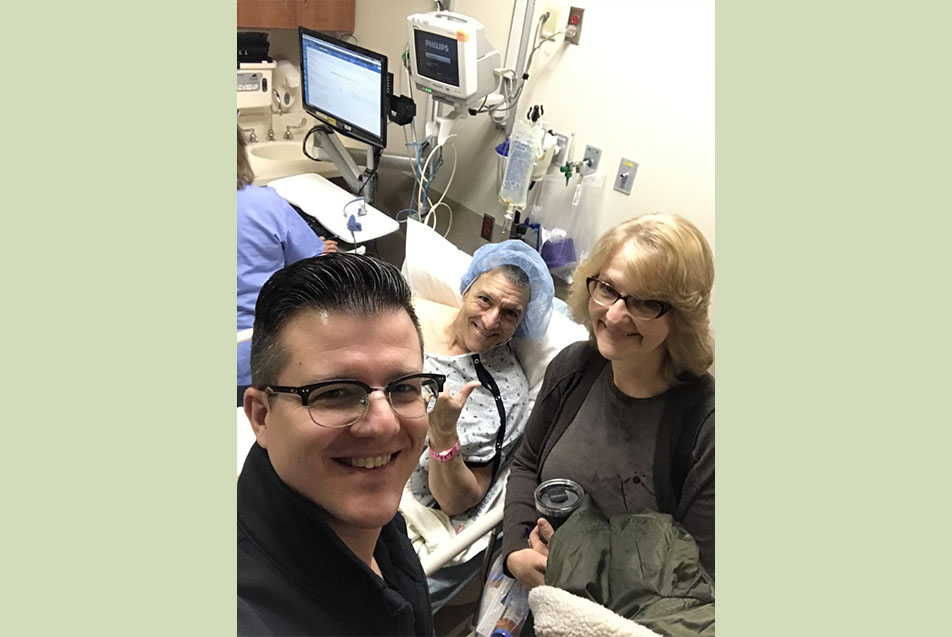
Counting your blessings
Despite his rare diagnosis and frequent health complications, Rob chooses to be grateful for his life and greets each day with the hope of new possibilities. He’s thankful for caregivers who share an inquisitive nature, a characteristic he found lacking with providers in the past.
“I was thrilled to come into a healthcare system that didn’t give up on me,” he said. “I’m a rare case, so working with people willing to dig deeper when something’s not right is refreshing. I speak for my entire family when I say we feel like Parkview is on our side and in our corner. I can’t express my gratitude enough. I’m so thankful for everyone involved in my care. You’ve all been a huge part of caring for my physical needs, but you’ve also provided so much peace for my family and their emotional needs as well.”
When asked what helps him get through life’s most challenging moments, without hesitation, Rob replied, “Hands down, my faith and relationship with Jesus. He’s kept me focused on what’s important. He’s my identity and my hope. He has surrounded me with so many blessings – my wife, children, grandchildren, family and friends – I can’t help but be grateful. It’s been an interesting 59-year journey, but God’s been with me the whole time. I’m excited to see what the future has in store.”



